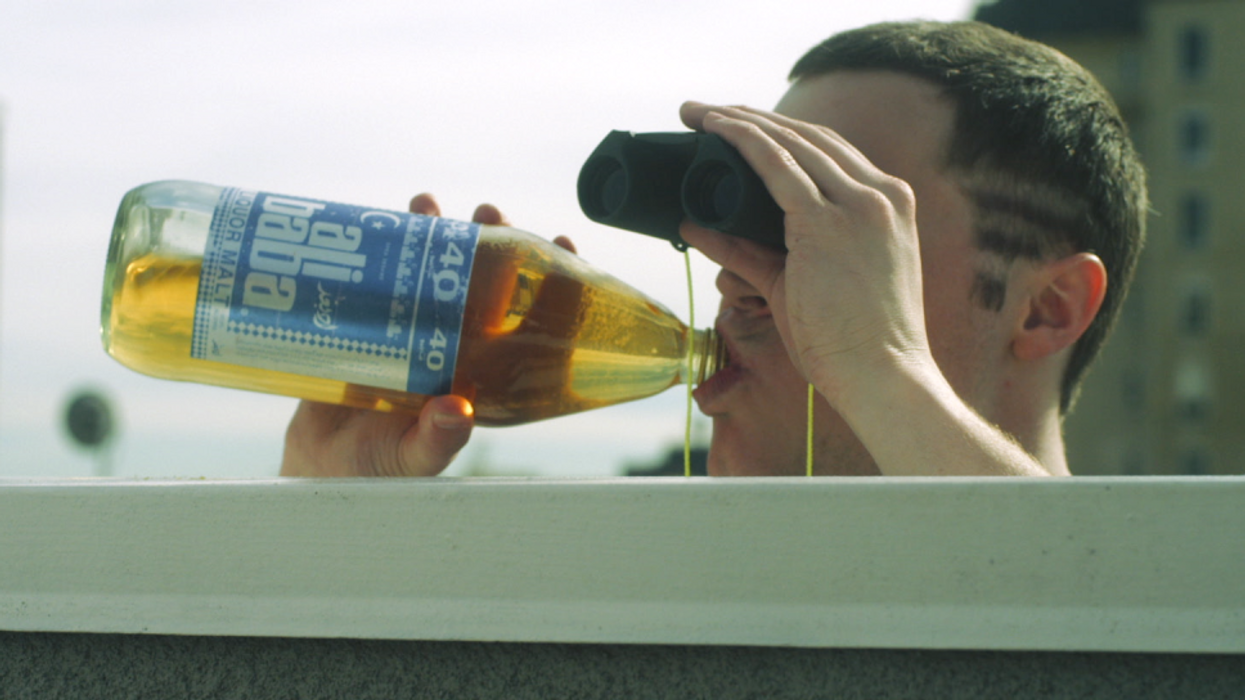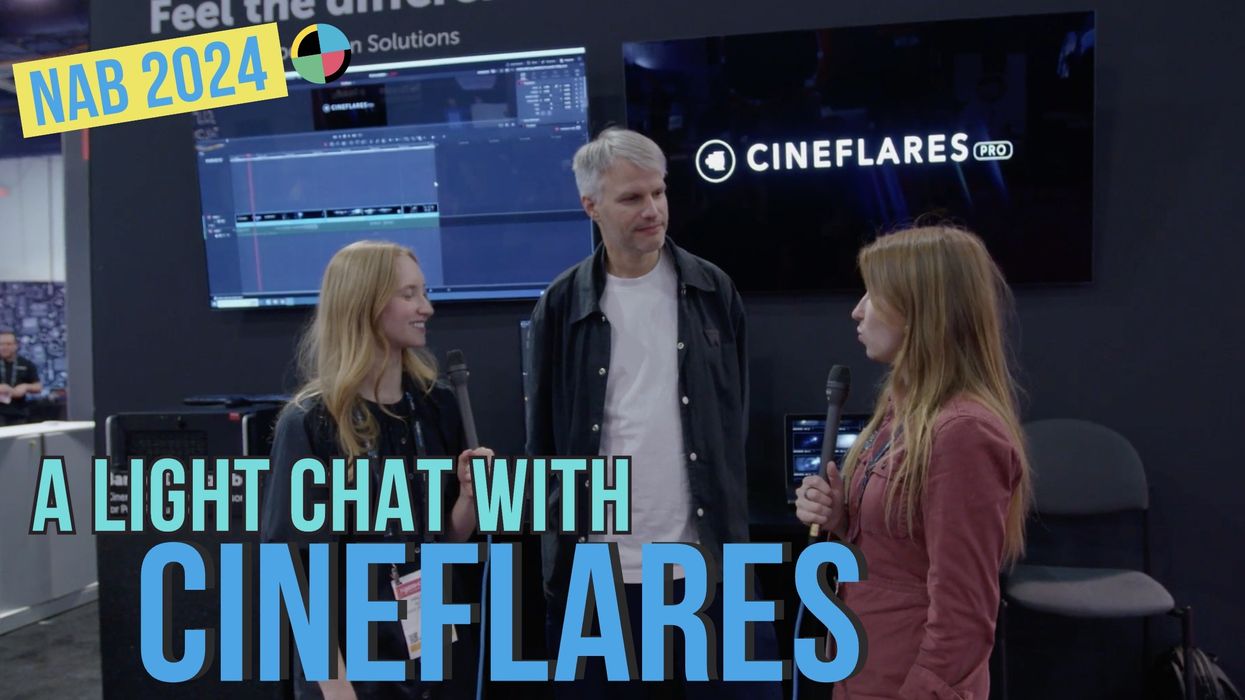Learn How to Design a Character-Specific World and Bring it to Life in Your Film
Filmmaker Weston Razooli combines his illustrations with custom-built props and costumes to bring his unique character visions to the screen.

Filmmaker Weston Razooli has been working towards his dream project, Kelza 55, since he was a teenager. The first manifestation of the world he's been creating is the slacker crime-adventure comedy Jolly Boy Friday, a short film that was recently picked up by Avenue A Distribution. We sat down with Razooli to talk about world building, writing for comedy and why his characters are akin to action figures.
NFS: What is the first thing you do when you start designing a world?
Razooli: I'm an illustrator, too, so I draw a lot. My stories will usually begin with a drawing of a character. I like to draw fantasy characters and costumes, and I'll draw one and then I'll want to find out where this character lives, what his story is. For Kelza 55, I drew this futuristic quadrophenia mod with a scooter and a jacket. I'll treat it almost like it's the back of a toy box, with the character description, the world he lives in, his equipment, his costumes. That's the mechanics of my mind. Then I'll do more drawings and write an outline to the story.

NFS: How much do you design before you write?
Razooli: They go hand in hand. For my thesis at CCA when I did the production and concept design for Kelza 55, I would work at night on the outline and then during the day, I'd work on props and costumes. I think my movies are more a portrait into a world of toys than an emotional rollercoaster.
"I'll treat the characters almost like it's the back of a toy box."
NFS: The design heightens everything; it's vibrant, juicy, it makes you want to touch it. I want to swig Alibaba beer.
Razooli: I make movies because I see a film as being a nucleus for tons of different art forms. Movies are one of the only things you can get away with doing all these things on because it's all directed towards one purpose. It's not enough for me to draw a character and leave it on the page. When I was a kid, I was so fascinated with the specifics in movies, if the character had a prop, like a gun. I fell in love with the little things the characters had, the things they were eating or the pipe they were smoking, and I would make those props out of cardboard. It's a childish craving—wanting to do what a cool adult was doing.
My goal is to make a world that you want to step inside, feel the sun on your back and drink a forty, plan some stupid stuff with your friends. Jolly Boy is all about excess and greed, I wanted to saturate the film with so much content. These kids want it all—they're crust kids living a modern day younger Scarface ideal.
NFS: How do you approach directing yourself?
Razooli: Directing myself is a weird thing. I've been doing it for a while growing up, but I'm not gonna do it anymore. Jolly Boy might be the last time I'll be in front of the camera as a main character. You need an assistant to watch your acting and someone to confer with. That eye is critical to have. You can't see yourself in the right way, it makes editing hard.
It also makes writing hard—I don't want to write with specific actors in mind anymore. It's not fun because I'm constantly thinking of my actor: "Can he say this line? Can he pull this off?" and the characters don't flourish. I'm gonna stay behind the camera from now on. The tone of Jolly Boy was supposed to be fun and crazy, but I wanted the acting style to be very natural to contrast that and hopefully that creates a depth.
"I try to make movies that I would've loved when I was a kid."
NFS: There's a lot of hilarious endings to scenes, it feels cut off or stunted, representing the half-baked thought process of these characters.
Razooli:Jolly Boy was a lesson for me in finishing scenes. I cut so much from it, it used to be a 25-minute short. All the scenes ended with the characters saying basically: "Okay, that's done, now let's go somewhere," and you can't have that. It takes the wind out of your pacing. I removed the scripted endings from so many scenes, so they end with what wasn't supposed to be the button. I think what makes it funny is that they weren't supposed to be there. The last thing we shot was the table in our apartment, we just rolled for 30 minutes on a 32mm and 30 minutes on an 85mm and those were by far the best performances. I punctuated the whole story with those moments.
NFS: It's hard to monetize short films these days. Tell me about your distribution plan.
Razooli: My distributor is a new distribution company called Avenue A, they're partnered with the Lower East Side Film Festival. They found Jolly Boy through that, emailed me and sent me a PDF of their projected distribution plan. It's a non-exclusive deal, but apparently the market for short films is a lot bigger in Europe and in traveling scenarios like on airplanes and cruise ships. So we're gonna try that and see what happens.

NFS: It takes a lot to get to a place where you can make a bigger film like Kelza 55.
Razooli: I have a vision of the stepping stones I need to get me to my dream project. I've created it myself, I don't know if it's the right thing, but it's what I've been going for and it keeps me sane. With Jolly Boy, it was always my plan to make this movie. I want to make big budget fantasy adventure films, but first I wanted to make a gritty, low-budget crime movie in L.A. or San Francisco that I can put my friends in and use the resources that I have.
"Work with your resources as your early stepping stones. Finish work. It seems like everyone has that problem. No matter what you do, finish."
NFS: How do you know if something is funny on the page?
Razooli: When I'm writing, I don't think of my stuff as comedies. I think of humor as water that you need to water your whole project with. It's a natural thing that happens, as if I was watering my plant with humor and jokes to keep it alive. Comedy is a way to give something life, to keep it alive. Jolly Boy is a dark subject, Kelza 55 is a dark film, but I don't personally want to make a super dark film. I'd love to explore dark concepts with humor to get contrast. I think comedy keeps people around—how much more likely are you to show a funny video to your friend than a "super cool" video? Comedy are the lines that people repeat—I grew up in a household of people always quoting movie lines to each other.

NFS: How has Jolly Boy Friday informed your other work?
Razooli: To me it's the same thing, it's just my mind making other islands, other worlds. It's weird to some people that I'm making this super R-rated, gross, violent movie and at the same time developing a children's show. I try to make movies that I would've loved when I was a kid, Zabazuzu was the movie that I would've fallen love with when I was seven, and Kelza is the movie that I would love when I was 15, when I was discovering Quadrophenia and Akira.
NFS: What's the status of the Kelza 55 feature film and what else are you working on?
Razooli: I'm almost done with the script and I'm gonna do a table read soon and have a solid draft by mid-March. I'm gonna shoot another short that's more loyal to the Kelza feature. I have some interest from Anonymous Content and I'm going to take their advice. I'm going forward with the next steps of Jolly Boy, which is the Kelza 55 draft, I'm also working on Zabazuzu, my animated show that I'm developing with Anonymous Content and Cartoon Network.
NFS: Advice for filmmakers?
Razooli: Work with your resources as your early stepping stones. Finish work. It seems like everyone has that problem. No matter what you do, finish.
Jolly Boy Friday is available now on Vimeo on demand for $1.












